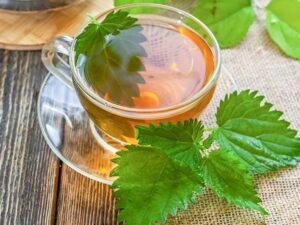Table of Contents
Stinging Nettle: A Medicinal Plant with Surprising Health Benefits
What is Stinging Nettle?
Stinging nettle (Urtica dioica) is a perennial flowering plant known for its stinging hairs that cause irritation upon contact. Native to Europe and Asia, it has been used medicinally since Ancient Greece and is now cultivated globally. The plant thrives in nitrogen-rich soil and grows up to four feet tall, blooming between June and September.
Despite its reputation as a stinging irritant, stinging nettle offers numerous health benefits when processed correctly. It contains bioactive compounds like serotonin and histamine, which contribute to its therapeutic properties.

Stinging Nettle: Benefits, Uses, and Safety Tips
Why Does Stinging Nettle Sting?
The stinging sensation occurs due to chemicals like serotonin, histamine, and acetylcholine stored in the plant’s tiny hairs. When these hairs break upon contact, they inject these irritants into the skin, causing redness, swelling, and itching.
Health Benefits of Stinging Nettle
Stinging nettle is celebrated for its antioxidant, anti-inflammatory, and antimicrobial properties. Let’s explore some of its key health benefits:
1. Relief for Enlarged Prostate and Urinary Issues
Stinging nettle root is effective in managing benign prostatic hyperplasia (BPH), a condition where an enlarged prostate causes urinary problems. Research shows that its chemical compounds influence hormones and prostate cells, alleviating symptoms. It also serves as a natural diuretic, promoting healthy urine flow.
2. Alleviating Osteoarthritis and Joint Pain
Arthritis sufferers can benefit from nettle’s anti-inflammatory properties. When used alongside NSAIDs, nettle can reduce joint pain and allow for lower NSAID doses, minimizing side effects. Topical applications and oral consumption both provide relief.
3. Managing Hay Fever
Stinging nettle helps prevent hay fever symptoms by modulating histamine levels. Studies, including a randomized, double-blind trial, have demonstrated its effectiveness compared to placebos in reducing allergic reactions.
4. Blood Pressure Regulation
Nettle may support heart health by promoting nitric oxide production, which relaxes blood vessels. It also acts as a calcium channel blocker, helping to lower blood pressure. While more human studies are needed, preliminary animal research shows promising results.
5. Skin Health and Eczema Relief
The antihistamine and anti-inflammatory properties of nettle make it a natural treatment for eczema. Combined oral and topical applications can soothe itching and redness, providing long-term relief.
Additional Benefits
Stinging nettle is also linked to promoting lactation, controlling blood sugar levels, stimulating hair growth, and even aiding in wound healing. While these claims require further research, anecdotal evidence supports its versatile applications.
How to Use Stinging Nettle
1. Nettle Tea
Dried nettle leaves can be steeped to make tea, often combined with other herbs for added benefits. This soothing beverage is rich in vitamins and minerals, including iron and vitamin C.
2. Cooked Nettle
Nettle leaves can be cooked like spinach or blended into soups and smoothies. Cooking neutralizes the stinging hairs, making it safe and nutritious to consume.
3. Topical Applications
Nettle creams and tinctures can be applied to joints and areas of pain for localized relief. These products are widely available at health stores.
4. Capsules and Tablets
Stinging nettle supplements provide a convenient way to enjoy its benefits. Consult a healthcare provider for appropriate dosages to avoid side effects.
Safety Precautions and Side Effects
While stinging nettle is generally safe, it’s important to exercise caution:
- Pregnancy: Avoid use as it may stimulate uterine contractions.
- Medication Interactions: Nettle can interact with blood thinners, diuretics, and sedatives. Consult a doctor before combining with other treatments.
- Allergies: Start with small doses to monitor for adverse reactions.
Harvesting nettle requires gloves to avoid stings, and young plants are preferred for consumption as older plants can taste bitter.
Conclusion
Stinging nettle is a remarkable plant with a wide range of health benefits, from managing allergies and joint pain to promoting heart health. By understanding its uses and precautions, you can incorporate this versatile herb into your wellness routine.
For more information, visit trusted sources like Mayo Clinic, WebMD, and Healthline.